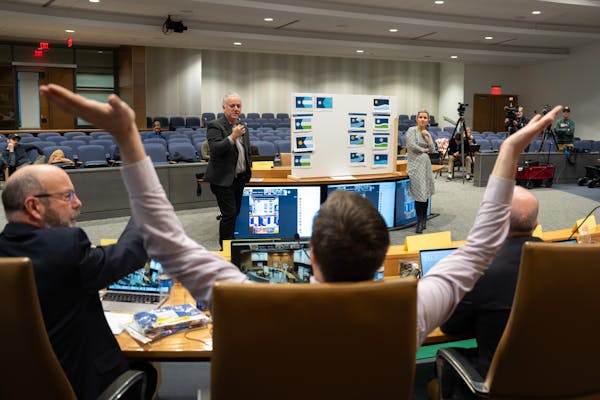Minnesota's state flag and seal have drawn criticism for decades because of their controversial depiction of Native Americans.
Soon, the state seal will feature the Dakota language.
Members of the State Emblems Redesign Commission adopted changes to their chosen state seal design this week and revealed the final product on Friday. A red-eyed loon poses on a Minnesota lake surrounded by pine trees, the North Star and sprigs of wild rice. Above the image are the words: "Mni Sóta Makoc̣e," Dakota for the "land where the waters reflect the sky."
"If we are going to include a language within the seal, really thinking about the first language of this land, paying respect to that," said Kate Beane, a member of the commission and a Dakota woman who spent years as director of Native American Initiatives for the Minnesota Historical Society.
Minnesota's original seal — created when the state was still a territory — features a white settler plowing a field in the foreground while a Native American man on horseback rides off into the sunset. At the time of its creation, the still-developing nation celebrated the idea that white settlers were destined to take over.
The change to the design came after hours of debate over whether to include the state's motto — "L'etoile du nord," or "the Star of the North" — in its original French or another language. Some members argued the commission couldn't change the language of the official motto. Others said the motto didn't need to be on the seal at all.
Instead, the commission favored leaving the state motto off the seal and instead adding the Dakota words from which Minnesota derived its name.
Some members pushed back, concerned that adding the language could violate the state law creating the commission, which said they cannot adopt any "symbols, emblems, or likenesses that represent only a single community or person."
"This is a longer version of the name of the state," said Rep. Mike Freiberg, a Democrat who sponsored the legislation last session to create the commission and serves on it as a non-voting member. "I don't think it's a clear-cut case."
But a majority of members supported the change, which will be featured on official government documents and around state buildings.
"As a teacher, I see the benefits, because people will look at our seal and say: 'What is that, what is Mni Sóta Makoc̣e?'" said Anita Gaul, a commission member and a college history professor from southern Minnesota. "That's a teaching moment right there."
Unless the Legislature vetoes the design, it will become the official seal of the state of Minnesota in 2024.
Former DFL Senate Majority Leader Kari Dziedzic dies of cancer at age 62

How the Star Tribune is covering the 2024 election

Fact check: Walz and Vance made questionable claims during only VP debate

In Tim Walz's home city, opposing groups watch him debate on the national stage

